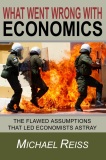Its seems incredible to me that amongst all the talk about the housing market by Mark Carney, George Osborne and the media, there is scarcely any mention of its connection with the money supply. As readers of this blog should know by now, new loans increase the money supply whist repayments of existing loans shrink it. In the UK, lending is dominated by the housing market. Far more money is lent for house purchasing than for business. Putting these facts together means that the total amount of money that circulates in the economy as a direct function of the state of the housing market. A housing boom corresponds to a growing money supply, whilst a bust would shrink the money supply, just like in 2008. We are now in a very unstable situation. If regulators succeed in bursting the current housing bubble it would either lead to an immediate recession (this is what a shrinking money supply does), or alternatively quantitative easing would have to start all over again.
With this precarious situation, why are the words
"money supply" not on everybody's lips?




